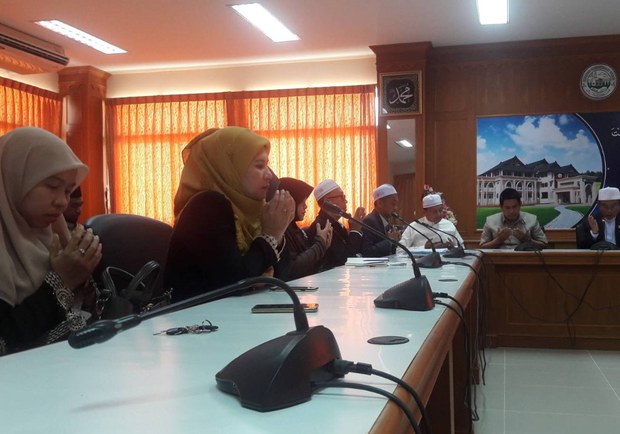Thai Education Ministry Bars Hijab at Buddhist School in Deep South
2018.06.14
Pattani, Thailand
 Parents of Muslim students who attend the Anuban Pattani School pray while visiting the Islamic Committee Office in southern Thailand’s Pattani province, May 18, 2018.
Parents of Muslim students who attend the Anuban Pattani School pray while visiting the Islamic Committee Office in southern Thailand’s Pattani province, May 18, 2018.
Thai education officials have ruled that Muslim students attending a Buddhist-run school in the mainly Muslim Deep South region are required to wear uniforms and cannot dress according to Islamic customs.
Buddhists and Muslim students alike must wear uniforms and abide by the dress-code of the school, which sits on the property of a Buddhist temple, Wat Noppawongsaram, the Ministry of Education ruled. Girls and boys at Anuban Pattani School are required to wear knee-length skirts and shorts, respectively, and girls may not wear hijab.
Pattani is one of the provinces in Thailand’s troubled southern border region, where a separatist insurgency has gone on for decades.
A ruling published in Thailand’s Royal Gazette on Wednesday said Muslim students at non-Islamic schools could “opt” to wear uniforms or follow the dress code – except at schools located on temple properties, where it would be mandatory.
“With the exception of schools that share temple property, the dress code should comply with the agreement between the temple and the school,” the notice said.
As many as 1,838 students are enrolled at the school in Muang Pattani district, and 40 percent are Muslims, according to demographic information posted on the school’s website.
The dress code decision went all the way to Bangkok after parent protests at the school.
On May 18, some 50 Muslims parents staged a protest after the school barred hijabs on campus. Two days later, the Education Ministry ordered the school to drop the ban.
That led to a protest on May 23 by some 300 local Buddhists, who demanded that all students be required to wear the same uniform.
Reacting to the latest decision by the Ministry of Education, a parent of a Muslim student at Anuban said he would move the child to another school.
“I will discuss this with other parents and we may jointly leave, but we have to discuss this with many parties,” the parent told BenarNews.
Meanwhile, some observers criticized the decision by the ministry, saying it could inflame tensions between ethnic Malay Muslims, who form a majority here, and Thai Buddhists.
“What looks like a tiny matter may be interpreted as religious deprival of a minority that would fan the flames in the troubled Deep South. We heard about concerns of the Buddhists in the area who fear the violence may increase,” Rungrawee Chalermsripinyorat, an expert on regional security, told BenarNews.
Areepen Uttarasin, a former deputy minister of education, said the move could create a feeling of injustice leading to “disharmony” among the communities of the Deep South.
Nearly 7,000 people have been killed in violence in the Deep South since Malay Muslim insurgents re-ignited their armed separatist movement 14 years ago.
Since 2015, Thailand’s military government has held peace talks with a panel representing various southern rebel groups and factions. But violence has persisted and the two sides have yet to set up a long awaited limited ceasefire or “safety zone.”







